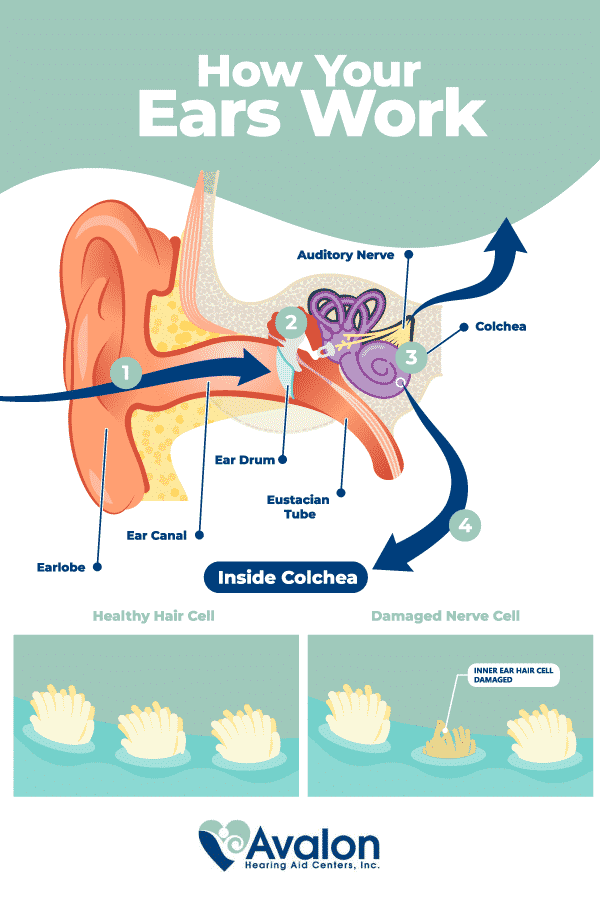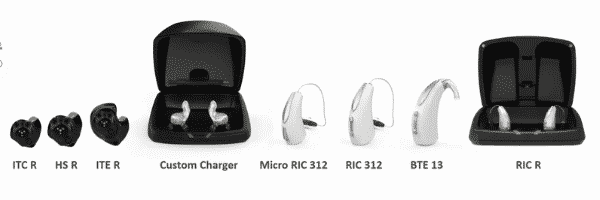Chickens may unlock a cure for hearing loss one day. They (and some other birds) can regrow the tiny, hair-like nerve cells in their inner ears after injury. Scientists at Stanford University are studying chickens in hopes of restoring human hearing in the future.
But in the meantime, here’s what you need to know
Many people who develop hearing or clarity problems do nothing about it. You may know someone like this, or you may have been someone like that. But the average American waits five years before seeking help. What people don’t realize is the longer you live with untreated hearing loss, the more difficult it becomes to correct, and the less likely you’ll be happy with hearing aids.
For many of us, the small nerves deep inside the inner ear or cochlea, get damaged over time. You might say that they lay down and die. If you were a chicken, you would just regrow new nerves. But you’re human so they don’t regenerate. You start noticing that people seem to mumble because you may be missing the S, T, F, K, and TH or softer sounds of language.
Over the years, the brain actually loses its ability to process the sounds that you no longer hear. It forgets how to make sense of these sounds. Even when these forgotten sounds are re-introduced through amplification, the brain may not be able to effectively use this new information. Sounds may be amplified but may not give the needed clarity to understand speech easily. This phenomenon is known as auditory deprivation.
If you don’t use it, you lose it
Last week I met two new clients. One woman knew about the importance of getting hearing instruments sooner than later. Her speech understanding went from 76% without help to 96% with hearing help. The other client was concerned about what it meant to give into wearing hearing aids, so he decided to “wait until he had to get them”. His speech understanding was only 56%. I was only able to get him up to 80% clarity. He waited too long. Sure, hearing aids will help this client, but had he come in years earlier, his understanding might have improved to 96%, like the woman. By the way, this is why everyone’s experience with hearing aids can be so different.
Hearing aids are like exercise machines…for your ears and for your brain
At this point in time, there is no medication or surgery that can restore your lost hearing. (Remember, you’re not a chicken.) However, if you don’t wait too long, we can overcome this weakness in your hearing system by using properly fitted hearing instruments – emphasis on PROPERLY. Hearing aids can enhance what’s left of your hearing. And they actually preserve or maintain your ability to process sounds and make sense of conversation. As long as you continue to stimulate what’s left of your hearing, you can expect to understand quite well even if your hearing changes over the years. (By the way, people with untreated hearing loss also experience a 30-40% faster decline in cognitive abilities. That’s another reason to get hearing help, sooner than later.)
Rechargeable Hearing Instruments from Starkey Technologies
Next week, I’ll talk more about AUDITORY DEPRIVATION and how it applies to all of you who are wearing hearing aids, now.
If you have been putting off getting help for your hearing loss, even a mild loss, would you look at why you are waiting? Then, pick up the phone and make an appointment for your Free EDUCATIONAL Hearing Test & Consultation at Avalon Hearing Aid Centers. It does not matter what insurance you have. We’ll find out how well you are understanding, now, and how much better you could understand with PROPERLY fitted hearing instruments. If fact, we’ll let you test drive the latest hearing technology so that you can hear it for yourself!



